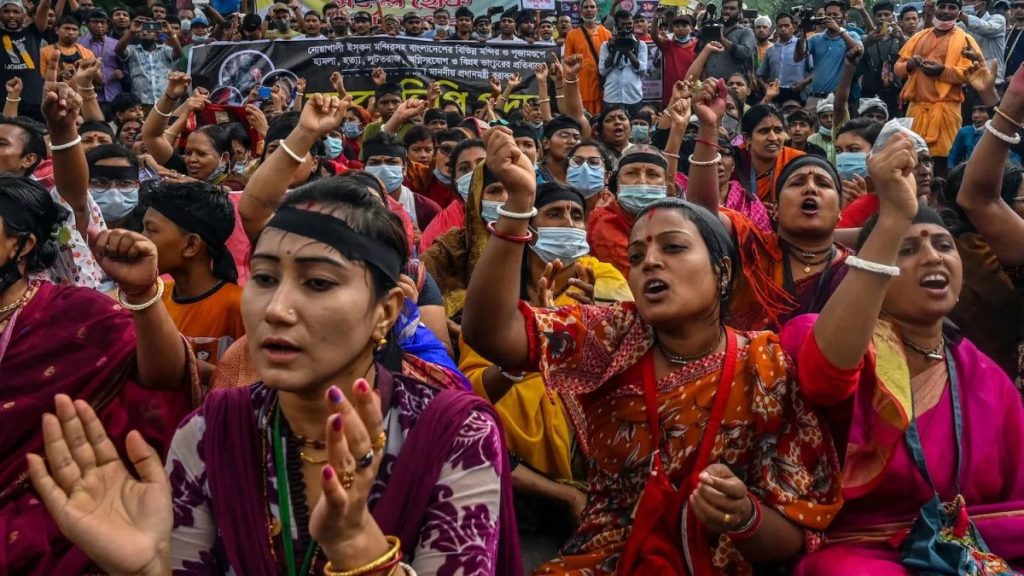For me, August 5 hardly materialized as the unequivocal victory and jubilation that I had beeneagerly waiting for. Instead, it was marred by a harsh wake up call, as the fall of the Hasina regime laid bare the festering wounds of our society.
The temples burned. Again. The screams echoed. Again. The powerful played their games. Again. We are standing on a dangerous precipice. On one side is an abyss we can never return from, and on the other, a path to heal ancient wounds and build a new, post-communal Bangladesh.
A Legacy of Division
The roots of our current predicament can be traced back to the days of British colonial rule. The seeds of Hindu-Muslim tensions, sown by divide-and-rule policies, germinated into the painful partition that gave birth to India and Pakistan along communal lines. Even as Bangladesh emerged as a secular nation in 1971, the wounds of this centuries-old communal division never fully healed. Sheikh Mujibur Rahman’s vision of Bengali nationalism, while powerful, fell short of
truly uniting all of Bangladesh’s diverse communities. The post-1975 era, marked by the designation of Islam as the state religion and the rise of Islamist forces in politics, further marginalised Hindu communities who were often unfairly caught in the prevailing anti-India headwinds.
A Pawn at the turn-tables of Power
Since then, minorities in Bangladesh have been treated as political pawns, played by parties more interested in power than in fostering genuine unity. The Awami League postured as the protector of minorities, leveraging this role to gain support from India while tightening its autocratic grip.
The party also capitalized on the Hindu vote bank through fear-mongering(sometimes going as far as staging assaults to stoke the fear of BNP and Jamaat), and expected undying loyalty in return for placing Hindus in prominent bureaucratic positions.
A transaction of souls for power. How very democratic!
On the other side, parties like Jamaat and BNP – the self-proclaimed vanguards of faith – saw
in the weakness of the ‘minorities’ an opportunity for plunder. Land grabs and extortion, and anti-Hindu propaganda, dressed up in the garb of patriotism. How very holy! This cyclical and cynical game has left minorities in a perpetual state of insecurity, regardless of which party holds power. We as a people – the collective of all Bangladeshis – have failed to ask why “minorities” as a word should even exist. Why should we let this outdated construct be exploited to divide, to others, and to subjugate? Why, in 2024, are we still clinging to these colonial ghosts that refuse to be exorcised?
Truth lost in a flood of disinformation
In the power vacuum and complete law-and-order breakdown left by Hasina’s departure, we have once again seen a disturbing surge in violence against minorities. Over 200 incidents have been reported, including five tragic deaths. While some of this can be attributed to vengeance against perceived AL supporters or opportunistic crime, it speaks to a broader failure of our
society to protect its most vulnerable members.
The situation has been further inflamed by irresponsible media coverage, particularly from Indian sources. False narratives and out-of-context claims have muddied the waters, making it
difficult to identify and address the real cases at hand. In a defensive response, some on the Bangladeshi side have swung to the other extreme, downplaying or denying the very real fears and dangers faced by minority communities, at the cost of gaslighting their plight and ignoring their genuine cries for help. The truth, as always, lies bleeding in the gutter between these extremes.
And the fear-mongering continues. Anecdotal reports suggest that unidentified sources are spreading intentional fear among the Hindu communities. While it is not yet clear which sources are yet, it is not hard to logically deduce – reading between the rumour mills, clues such as the coordinated and immediate nature in which the Hindutva propaganda machine sprung into action, and the angle of the interviews by the outgoing regime on Indian media channels – who stands to benefit the most from widespread communal violence in Bangladesh
and the resultant international outcry against the new government.
A Glimmer of Hope?
Yet, amidst this darkness, there are faint glimmers of hope. Compared to previous periods of political transition, we’ve seen less overt communal hatred. Stories of madrasa students and Islamic party members guarding temples, and political leaders across the spectrum condemning violence and even suspending members for engaging in it, suggest a slow shift towards a more values-based politics. This shift presumably reflects a growing hunger among Bangladeshis for justice, equality, and honest governance, as evidenced by the popular appeal of the anti-discrimination student protests which led to Hasina’s downfall. However, this progress is as yet fragile and could easily be undone, especially if the sources continuing to sow communal divisions are not identified and checked immediately.
The Path Forward
As one recent and representative message on a closed Telegram group reads, “ছাত্রলীগের শালারা একবার ফের আসছে ডাকাত হয়ে, মিশন ফেইল হওয়ার পর এখন ফিরে আসছে হিন্দু”.
The deep well of anger against the Awami League risks spilling over onto legitimate protests by Hindus and spreading into wider communal violence.
We stand now on the edge of a precipice, peering into an abyss. The choices we make in the coming days and weeks will determine whether Bangladesh steps back from this brink or plunges headlong into chaos. Several urgent actions are needed:
- The interim government must act swiftly and decisively to restore law and order, investigating and punishing all acts of violence, no matter how small.
- We must combat misinformation, particularly the fear-mongering spreading within minority communities. The sources of these dangerous rumours need to be identified and held accountable.
- Most crucially, we need to foster a unifying narrative that transcends communal lines. As Muhammad Yunus beautifully articulated recently during his visit to the Dhakeshwari temple, we are humans first and Bangladeshis second. Our shared identity and values must take precedence over divisive identity politics.
Only by embracing our diversity under a common banner of shared values and citizenship can we hope to banish the spectre of “minority politics” from Bangladesh once and for all. This is the United narrative that must stay front and centre as we face the international community’s scrutiny in the days to come. And this is the same narrative we must use to demand our rights from any prevailing government as a Bangladeshi people.
The time for half-measures and hollow promises is over. Once again, Bangladesh stands at the crossroads of history. The question is: Which way will we turn?
Author: Rubayat Khan



